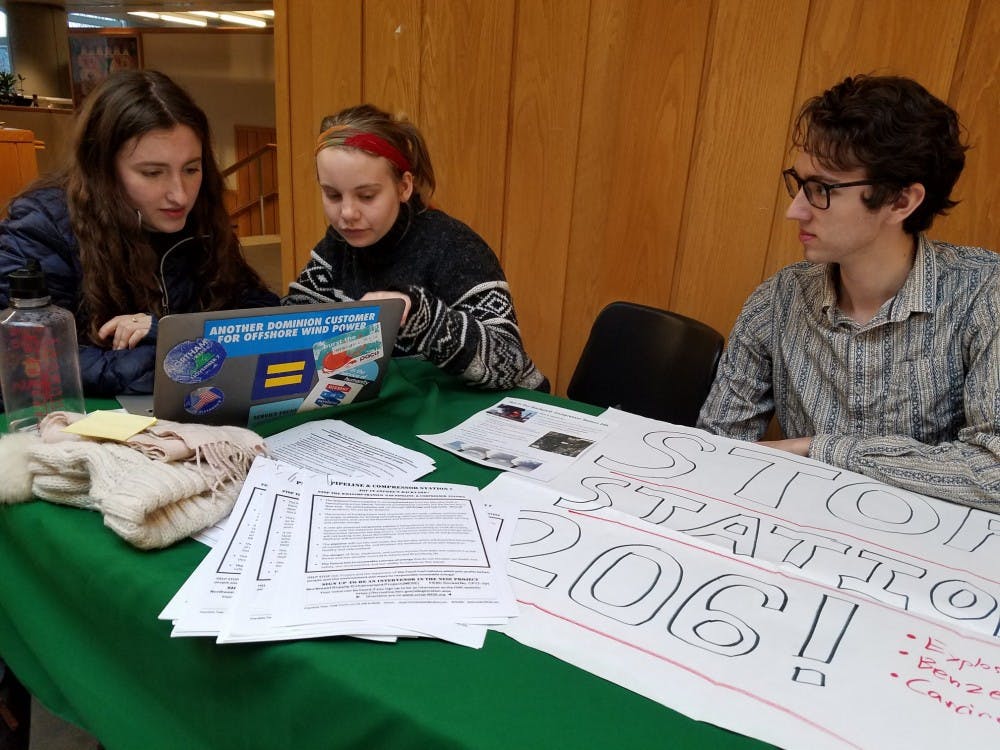A coalition of student groups headed by the Princeton Student Climate Initiative is mobilizing against the planned construction of a natural gas compressor station four and a half miles from the University.
Compressor Station 206 would be along the existing Transco pipeline as part of the Northeast Supply Enhancement Project, and would be in the between of the South Brunswick and Franklin Park residential areas, according to the Williams-Transco website. The compressor station will carry fracked gas from Pennsylvania through New Jersey for distribution to areas along the East Coast.
Students at the University and members of the local community have collaborated in advocating against the compressor station. A local environmental organization called Franklin Township Task Force helped inform PSCI about the timeline and public comments process. PSCI developed more streamlined ways for submitting such comments. PSCI also plans to help with ongoing research on the impacts of the plant.
The project raises major concerns for University students and Princeton community members. According to the Residents Against Compressor Station 206 website, compressor stations release pounds of toxic chemicals and carcinogens into the water and air, including benzene, formaldehyde, and ammonia. This can result in cancer, leukemia, asthma, and birth defects, among other issues.
In addition, the compressor’s location near an active stone quarry puts the region at high risk of fires and explosions, the severity of which nearby townships do not have the capacity to handle. Noise pollution is also a potential problem, according to the RACS website.
PSCI first heard about the compressor station project when Amanda Eisenhour ’21, the group’s political director, attended an environmental justice event at Rutgers University. PSCI was also approached by the Franklin Township Task Force at a local environmental event.
“Princeton is the last town to not have a grassroots movement mobilized against this station,” Jack Aiello ’21, a member of PSCI, said.
Franklin Township Task Force visited the University on March 30 to give a brief presentation. The presentation drove the students to make an action plan for the coming weeks. The main goal was to alert the Federal Energy Regulatory Commission and the New Jersey Department of Environmental Protection of the dangers of the proposed project.
“FERC has only denied two projects in its entire history of regulating these types of projects,” Aiello said.
FERC was responsible for releasing a draft environmental impact statement to analyze the environmental effects of proposed Compressor Station 206. However, FERC did not conduct an independent health impact assessment. Rather than gathering its own data, FERC made its estimates solely based on numbers provided by Williams-Transco itself.
“What we have heard about the environmental impact statement so far sounds very inadequate,” said Charles Copeland ’19, president of PSCI. The gray area surrounding the health consequences of the project makes the independent assessment crucial, Copeland said.
Because FERC has approved all but two project proposals, Copeland thinks of it as “essentially a rubber-stamp body.” Thus, Copeland supports pressuring the NJDEP to deny final permits for the project. To further this goal, PSCI and other advocacy groups are encouraging students to submit public comments to FERC before the deadline on May 14.

“You have to register as an intervenor, which means that you are going to be affected somehow, and almost everyone at Princeton will be because the project is supposed to come online by 2019. After that, you can express why you are concerned, and then FERC has to consider those comments,” Aiello said about the process. Comments also slow the compressor project down and make it more difficult for the company to receive funding.
Another focus is on building a Princeton Alliance for Our Health in hopes of pressuring the University to take a public stance on the issue. PSCI hopes this coalition can include everything from green groups to political groups to sports teams.
As of now, the Office of Environmental Health and Safety has not given an official statement.
Copeland noted that the time-sensitive nature of the project has occasionally been challenging. “It’s a fast-moving timeline. It’s a quickly developing project,” he said. “A few of our members, including myself, had to make some decisions about prioritizing this project over our schoolwork, our sleep.”
Copeland also cited the initial difficulty of engaging the student body.
“Princeton hasn’t always been a place conducive to this sort of local activism. We’re a very theoretical campus that generally doesn’t know what’s happening in our own backyard,” Copeland said.
PSCI has been working hard to spread the word on campus, tabling in Frist Campus Center and hosting various events. Many students ended up taking initiative and brainstorming creative ways to spread the word, including a profile picture-taking event set for this Tuesday. The outpouring of support and increase in comments encouraged Eisenhour, who has enjoyed speaking with students during tabling events. “It has been empowering to educate others,” Eisenhour said. “About 80 people signed up in four days of tabling.”
The role of civic engagement in fighting future projects like the construction of Compressor Station 206 is important to Copeland.
“I really do believe that citizen involvement can have an impact on these types of projects,” Copeland said. “If the station is going to pose a serious threat to people and if people contact and get the word out to the right kind of government agencies and put the right kind of public pressure, I think the government will respond.”








